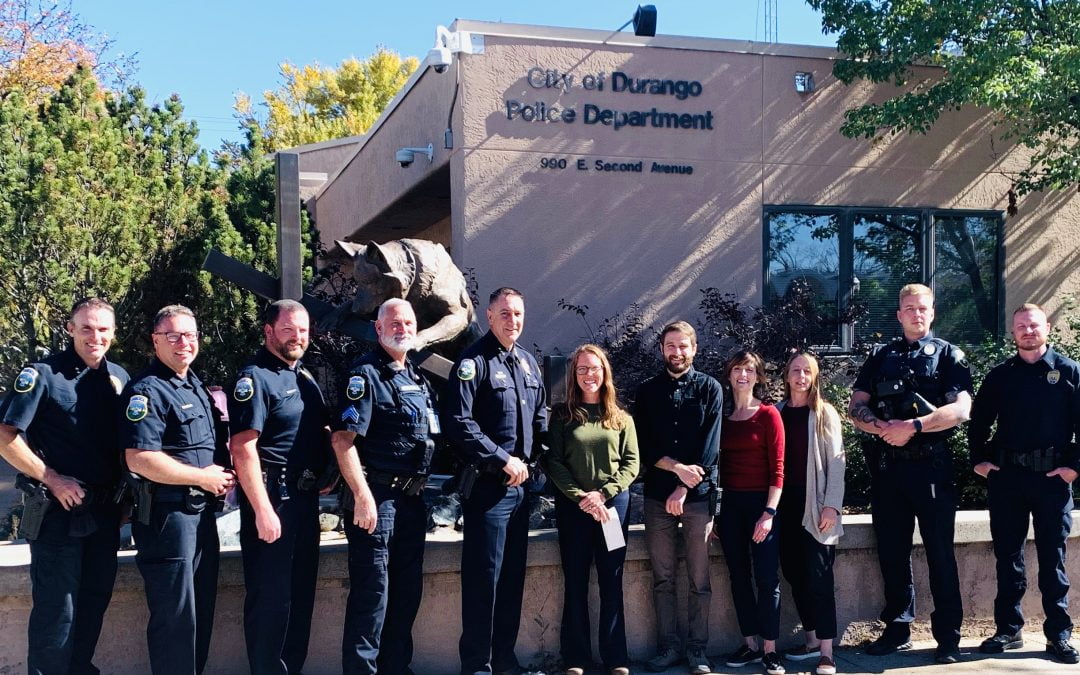The Durango Police Department partnered with Axis Health System to launch the new Co-Responder Program (CORE), which pairs behavioral health providers and law enforcement.
In 2021, Axis Health System (Axis) started a new partnership with the City of Durango Police Department (DPD) to enhance the coordination of effort and response capacity through the new Co-Responder Program (CORE). In its first year, the program served over 600 individuals. Team members worked to connect community members to appropriate levels of care, including primary care and critical community resources in addition to mental health and substance use supports. The CORE team received a Public Service Award in Durango to recognize the impact created in such a short amount of time.
The intersection of law enforcement and the social and health safety-net needs of the community has become more pronounced over the years, and requires a new approach and new resources. The CORE Program is a co-responder model staffed and designed based on joint data and collective experience in the City of Durango. The CORE program pairs a DPD Crisis Intervention Team officer with an Axis Behavioral Health Specialist who co-respond to situations based on 911 dispatch criteria.
“We are incredibly excited to be partnering with the City of Durango and Durango Police Department in offering this new pilot program in Durango,” said Shelly Burke, Chief Executive Officer of Axis Health System. “We feel that CORE can build a better bridge between social and health needs that may be part of certain emergency 911 calls.”
Previously, DPD responded to 911 dispatch, including dispatch related to non-criminal events that may be more effectively addressed with the CORE model. Many of these calls involve homelessness, substance use, public health violations, mental health escalation, dispute resolution, situational conflict mediation and welfare checks, among many others. Additional support is available 24/7 through the Axis 24/7 Care Line’s crisis team.
Creating the new CORE program was an essential step for our community for non-criminal events reported through 911. It effectively addresses situations when there is an intersection between safety, social and health crises for individuals in the community. CORE builds on the longstanding success of the annual law enforcement Crisis Intervention Training (CIT) program started by Axis in 2001 to support officers in behavioral health response and de-escalation skills. Currently, over 50 percent of DPD are trained CIT officers, which has been very successful.
Across the U.S., co-responder teams have demonstrated improved interactions between law enforcement and the people they serve. Communities have also recognized savings by connecting people to appropriate services and resources, rather than using more costly, higher level interventions. Nationally, the benefits of co-responder programs include:
- Connecting people with available resources and offering follow-up: Teams offer appropriate options for individuals and coordinate follow-up. Once legal consequences are ruled out, outcomes can range from leaving the individual with necessary resources, transporting the individual to a hospital or walk-in clinic or providing support and resources for family members and others on-scene.
- Increasing linkage to appropriate level services: Results indicate that co-responder teams report success in diverting community members from formal actions (arrests, mental health holds, and emergency department transports).
- Helping to build trust with community members: Individuals who frequently come in contact with co-responders are more likely to accept help and enroll in a behavioral health program than those who have fewer contacts with the co-responder teams. This suggests that the co-responder model can be a valued and trusted community resource.
- Responding to referrals and frequent utilizers of 911: After-the-fact referrals from law enforcement are helpful for people in need of service referrals. Since teams cannot respond to every call, after-the-fact referrals are an important avenue to reach additional community members in need of behavioral health or other services.
A similar program will launch in Montezuma County in April of 2022. We are currently hiring for new team members for crisis and co-responder teams. To learn more about how to join our team, click here.


